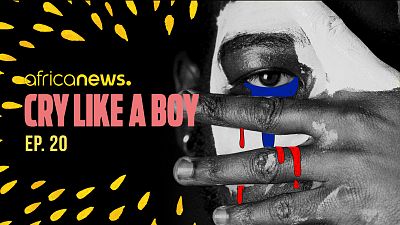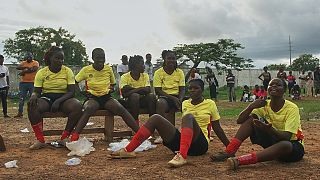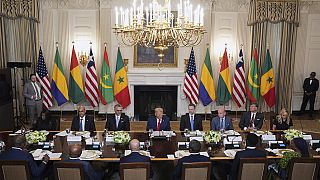Liberia
Women in Liberia were determined and passionate to end the civil war in their country after 14 years of conflict. But the weapon that they used was the force of their voices. They sang peace songs and made sure everyone was listening. Together, the women had the power to change the course of Liberia’s war in 2003.
In this episode of Cry Like A Boy, we reflect together with Gini Reticker, Oscar-nominated and Emmy Award-winning US director, and Cecelia Danuweli, from the Women in Peacebuilding Network (WIPNET), on the impact of women's power to end war.
Like this episode? Share your thoughts on how you have challenged your view on what it means to be a man using the hashtag #CryLikeaBoy. And if you are a French speaker, this podcast is also available in French: Dans la Tête des Hommes.
Please do not hesitate to listen and subscribe to the podcast on euronews.com or Castbox, Spotify, Apple, Google, Deezer, and give us a review.
THE PEACEFUL SOLDIERS OF LIBERIA: THE POWER OF WOMEN - TRANSCRIPT
Mame Peya Diaw: Welcome to Cry Like a Boy, a Euronews original podcast that is dedicated to revealing stories of men who are defying centuries old stereotypes in five different African countries. I am Mame Peya Diaw and today we continue our discussion on the role of Liberian women of different ethnicities and religions to end the war. If you haven't heard the documentary episodes of our Liberian series, we invite you to do so by visiting our website at euronews.com. We will be learning more on this topic with director Ginny Reticker, Oscar nominated and Emmy Award winning director from the US, and Liberian Cecillia Danuweli of the Women in Peace Building Network to discuss the role of women in conflict resolution and peace building. In the previous episodes, we talked about the struggle of this group of Liberian women who demand an end to the civil war, these women would not stop until peace was brought back in their country. Cecilia, last time in our conversation, we mentioned one woman's determination and passion to ending this war in Liberia. When did you realise that you had the power to change the course of the war in Liberia? And what were your weapons, if not physical force?
Cecelia Danuweli: I realised that I had the power to change the course of the war in Liberia in 2003, where I joined over thousands of women. We came all outnumbered to make sure to put an end to the war. And we did it with passion, and I was so passionate about it that my children almost got killed in the embassy compound where they were seeking refuge while I was on the field talking peace. And so I realised that the power of a woman and a power in my voice to speak truth to power and to make sure that they would come to an end. And that's what we did. The weapon that we used was the force of our voices, we sang peace songs that were necessary and when necessary we cried and we sang a song of peace to our warlords.
We brought them to the hills and made sure that they were able to listen to us for everything that we did peace was our goal. I realised that women have gained a space in Liberia not in the political arena.
They are still being marginalised because of cash violence. When it comes to speaking up, every woman in a village knows her rights and she speaks about her rights right now in Liberia.
After the war and the women, if you just ask them the question, I tell you, please don't violate my rights. And so they are so aware of their rights because of the awareness that was created for 2003 until the present. And I also realised that doing that particular process, we have our T-shirts that serve as that physical weapon that we wore every time we went out in the field to go for our non-violent protest. As soon as people see us with that T-shirt on at the community level, they won't be able to do what they were doing. They will listen to us. They will even call for us to call for dialogue.
When it comes to reconciliation in Liberia. No, that's not reconciliation. The warlords are still gaining their power. Some of them are at the House of Parliament. They still sit there and they are now steering the affairs of the communities. Some of them, for example, Prince Johnson and he has perpetuated more violence against women, children from his end even now, and so he's there at the Senate and is still there and still demanding and still threatening the course of action, whenever we talk about a war court, he is in defence of it and is now threatening that he will not go to the war court. So we have that as our processes that we are working on right now.
Mame Peya Diaw: Thank you, Cecilia, for this answer. So, Ginny, what was the reaction of audiences outside Liberia to the story of the documentary? What can we learn from this group of Liberian women?
Gini Reticker: The reaction to the film has been incredible, the first time that we showed it with the Tribeca Film Festival, we had an immediate standing ovation and the film has now played all over the world. You know, it has been played all over Africa, it has been played all over the United States.
Pray the Devil Back to Hell: I have a dream, and it was like a crazy dream. We decided to protest. We wore a white to people. We were at peace. Thousands of women: muslims and christians were coming together calling for peace. These women had seen the worst part and still had that vibrance for life. And we said, well, if I should get killed, just remember I was fighting for peace.
Gini Reticker: Audiences totally relate to the film, they're very inspired by the women in the film, and it's interesting because I feel like what people also have taken away from it is that if the women in Liberia could do that under the conditions that they did, it makes people feel that they can overcome things in their own communities, overcome things in their own lives. The reaction to the film continues to this day to be incredible. And it's still being shown all over the world.
Mame Peya Diaw: And I think a lot of women all around the world look up to these brave women. Even after the end of the war in Liberia, the role of women was recognised internationally with the awarding of the Nobel Peace prize shared by Leymah Gbowee and Ellen Johnson Sirleaf in 2011. So, Cecilia, do you think women's voices have gained space in the public debate in Liberia after the war?
Cecelia Danuweli: I would say yes. Women's voices have gained public space after the war in Liberia because women are more vocal right now when they are speaking out, especially when they are not keeping silent anymore. I take myself as an example. I don't stand for anyone to take me down when I know I'm right. And so I make sure that my voice is heard. And rural women, urban women, any woman in Liberia, now they know their rights so well and so they advocate for their rights. As soon as you try to trample upon it, they won't let you. I know what I stand for. I know what I want. I want my space and I want my voice to be heard. Our weapon was our T-shirts. Whenever we wore our T-shirts that had the label of the Women Peace Building Network, we wanted to show anyone that they knew that we were up for something. As soon as anybody saw us with that, they knew that there was something, something was wrong. So that physical strength, we had it through our T-shirts and our label showed that we want peace, no war. And so anywhere we wore it, anywhere we went, people were opening up, giving us peace, giving us the audience for us to speak about the atrocities that were happening in their country. So that was our physical strength. And they mean one was God, God himself. Give us the courage. And every time we did it, when we came back, we had to organise ourselves well. We will meet. And then when we meet, we debrief what we did. What we worked and what didn't, we listened to the voices of the women. My voice was a weapon. Now I go nowhere. And there is no injustice that I don't speak about, whether in school, when we are in a church, whether in the mosque and wherever my voice is. My voice is that strength that I have, the physical weapon that nobody can take away from me until God will take my life.
Mame Peya Diaw: Liberian women have been against violence in the country, and their actions contributed to ending hostilities after a 14 year civil war. In fact, President Ellen Johnson Sirleaf became the first female democratically elected president in Africa. And according to the United Nations, women's continued activism with clear messages to the public has led to their being considered community watchdogs, while they have also developed the concept of peace huts where women receive leadership and entrepreneurship training. In your career as a director, you have always given voice to women for years of change, as in Pray the Devil Back to Hell or the Trials of Spring, chronicling a young woman's journey from an Egyptian village to becoming an international human rights activist. When did you set out as a director to bring these women out of anonymity? And what impact has it had?
Gini Reticker: You know, I don't know that I ever actually set out to bring women out of anonymity in films. I come from a really big family. I have 10 siblings, and my mother didn't even really like having kids that much. But she was in the situation because she was Catholic. That's what happened. I saw what happened when women weren't recognised before I became a filmmaker. I was very much involved in the feminist health movement in the United States and the AIDS movement where the diseases that women had were not classified as AIDS, which had tremendous impact. So my first film was about women and AIDS. I've always been telling stories of women and it's because I feel like to not recognise but half the population does is a disservice to all of us. So all of these stories that I've told are because I'm really quite inspired by the women and I feel like they've contributed so much that's not recognised for me. It's good for all women. It's good for all of us to recognise what half of humanity is doing. And it's a disservice to all of us that we don't do that. And it's hard to imagine what you don't see. And so I think that the women of Liberia have been a tremendous inspiration to women around the world.
Mame Peya Diaw: And do you consider the Liberian case unique? Could it be applied to other contexts? And do women have the threat to unite and be an enabler of peace, such as the Liberian women?
Gini Reticker: I totally think it's something that's not unique to Liberia. In fact, I'm sure there's many other stories like this that have not been told where women come together and make changes in their communities. Part of the reason that I did go to Egypt to make the film The Trials of Spring is because I knew most of the reporting, again, was about women in the Arab countries kind of being victims and not having any rights. And in fact, that was not true, that the women in all of the Arab Spring played a huge role. And so I wanted to tell that story again, because you can see the story repeating all over the world.
Credits:
Mame Peya Diaw: Thank you for listening to Cry Like a Boy.
This show has been produced with me, Mame Peya Diaw from Nairobi, Carielle Doe in Monrovia, Liberia, Marta Rodríguez-Martinez, Naira Davlashyan and Lillo Montalto Monella in Lyon. Special thanks go to Lory Martinez, Clizia Sala and Studio Ochenta for helping us produce this podcast. Theme by Gabriel Dalmasso. Our editor in chief is Yasir Khan.
I would like to thank our guests: director Gini Reticker and Cecelia Danuweli. For more information on Cry Like a Boy, a Euronews original series and podcast, go to euronews.com to find opinion pieces, videos and articles on the topic.
Follow us on Twitter @Euronews is our Twitter handle and we are @Euronews.TV on Instagram. Also, share with us your own stories of how you changed and challenged your view on what it means to be a man using the hashtag #crylikeaboy. If you are a French speaker, this podcast is also available in French: "Dans la Tête des Hommes" is the name of the podcast series.
Please do not hesitate to listen and subscribe to the podcast on euronews.com or Castbox, Spotify, Apple, Google, and Deezer, and, of course, give us a review, if you wish!




















01:19
"Such good English": Trump compliments Liberian president, a native English speaker
Go to video
South Sudan's president Salva Kiir dismisses army chief Paul Nang Majok
01:12
One child displaced every five seconds in MENA region conflicts
00:51
Liberia's former president William Tolbert symbolically reburied, 45 years after his murder
Go to video
US embassy in Monrovia tells visa applicants to make social media accounts 'public' for vetting
01:56
Sudan war fuelled by external arms flow to the country